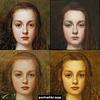Take a photo of a barcode or cover
informative
reflective
sad
slow-paced
My hatred for Bronson Alcott is eternal, pure, and true. 🔥
I'm going to need to come back to this because this book is so much more than I can put into words at 12:47 am.
The author does an excellent job ot documenting Louisa May Alcott and her father Bronson Alcott's life. The relationship they have is unique and it was enjoyable to see it evolve into a positive and well respected bond. However, I was left feeling sad that Louisa May most likely never felt successful in her father's eyes nor successful as a writer. She dreamed of writing serious adult works which never happened to her liking and continued to almost always be seeking out her father's praise. Also, I was struck that she never seemed to be happy or content. It isn't something you would expect or want for someone who wrote such an uplifting and positive book as Little Woman.
On a side note completing this book made me appreciate Geraldine Brooks' March that much more.
On a side note completing this book made me appreciate Geraldine Brooks' March that much more.
read part of this. boring. i was disappointed.returning to library without finishing.
Like many a young girl before and since, I grew up with Little Women: Meg, Jo, Beth and Amy March were the friends of my childhood, and like most readers of course I identified with Jo. What young girl wouldn't identify with Jo's struggles with her temper, her desires for wealth and fame, her siblings, her position as a girl in a man's world? And I always knew, vaguely, that much of Little Women was autobiographical, that Louisa May Alcott, just as the rest of us, identified herself with Jo.
Indeed, so much have the characters of the author and her most famous creation been conflated, that it is often hard to separate the two. And this is where this book is a joy and revelation, allowing Louisa May Alcott to step out from Jo March's shadow, revealing the woman herself and her own remarkable turbulent family, most particularly her father. It is curious that Bronson Alcott's alter ego, Mr March, is so absent from Little Women, when Bronson himself played such a large and enduring role not just in his daughter's life but in the lives of many other famous names - Thoreau, Emerson, Hawthorne - and in the transcendentalist movement of New England.
Louisa and Bronson led curiously parallel lives - being born on the same day, achieving literary success at the same time, dying less than two days apart - so it seems apt to tell their stories as a joint biography. Indeed, reading this wonderful book, it seems any other approach would do them both a disservice, so closely intertwined were the lives, so fundamental was their relationship to one another. This is no hagiography - it is hard to feel anything but frustration at Bronson's selfish selflessness in his younger years, and Louisa herself comes across as often wilful, fiercely and unnecessarily independent and stubbornly blinkered to her own support network. Indeed, Bronson becomes a more sympathetic figure as he ages, Louisa the reverse. But they both led fascinating lives in the perhaps most turbulent era of their country, brushing paths with some of the most famous names and in their own way leaving a permanent imprint on American literary and cultural history. And this superb biography more than does them justice. I cannot rate it highly enough.
Indeed, so much have the characters of the author and her most famous creation been conflated, that it is often hard to separate the two. And this is where this book is a joy and revelation, allowing Louisa May Alcott to step out from Jo March's shadow, revealing the woman herself and her own remarkable turbulent family, most particularly her father. It is curious that Bronson Alcott's alter ego, Mr March, is so absent from Little Women, when Bronson himself played such a large and enduring role not just in his daughter's life but in the lives of many other famous names - Thoreau, Emerson, Hawthorne - and in the transcendentalist movement of New England.
Louisa and Bronson led curiously parallel lives - being born on the same day, achieving literary success at the same time, dying less than two days apart - so it seems apt to tell their stories as a joint biography. Indeed, reading this wonderful book, it seems any other approach would do them both a disservice, so closely intertwined were the lives, so fundamental was their relationship to one another. This is no hagiography - it is hard to feel anything but frustration at Bronson's selfish selflessness in his younger years, and Louisa herself comes across as often wilful, fiercely and unnecessarily independent and stubbornly blinkered to her own support network. Indeed, Bronson becomes a more sympathetic figure as he ages, Louisa the reverse. But they both led fascinating lives in the perhaps most turbulent era of their country, brushing paths with some of the most famous names and in their own way leaving a permanent imprint on American literary and cultural history. And this superb biography more than does them justice. I cannot rate it highly enough.
I'm torn about my rating of this book. I would really like to give it a 3.5. I wish I would've read it before my brief visit to Orchard House this summer. The book gives great insight into the Alcott's life. I found the last part of the book easier to get through. Overall the book was good - I'm glad I read it. Just rambled and overly wordy in places.
I'm very much the right audience for this book--I read Little Women and its sequels too many times to count when I was growing up, and in fact at one point named one of my dolls Louisa May Alcott Bassham. (Between this book and My Wilder Life, the last couple of months have been a real trip down Memory Lane.)
But leaving that aside, Matteson does great work in this book. It's a dual biography of Louisa and her father Bronson (they died a mere three days apart), who are both fascinating characters. Matteson has obviously done a lot of research, but he wears it lightly. He writes well; the book was simply a joy to read. I only wish I'd read it before we visited the Alcott house a couple of years ago.
But leaving that aside, Matteson does great work in this book. It's a dual biography of Louisa and her father Bronson (they died a mere three days apart), who are both fascinating characters. Matteson has obviously done a lot of research, but he wears it lightly. He writes well; the book was simply a joy to read. I only wish I'd read it before we visited the Alcott house a couple of years ago.
This fascinating dual biography, of Louisa May and Bronson Alcott, was really worth reading (I'm a very slow non-fiction reader, so this was a big time investment for me). Bronson, especially, had quite an unusual personality. The reader is led through Bronson's Temple school experiment, the failed Fruitlands utopia, then moves on to focus more on Louisa May Alcott--her initial attempts at being published to earn money, her service in the Civil War (accompanied by typhoid and subsequent mercury poisoning), and, finally, her success with Little Women and other books. Highly recommended.



